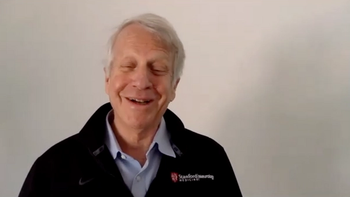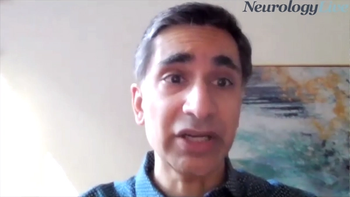
Researchers compared Neuro-QoL scores between patients treated with natalizumab and ocrelizumab, another high-efficacy treatment for MS.

Researchers compared Neuro-QoL scores between patients treated with natalizumab and ocrelizumab, another high-efficacy treatment for MS.

The clinical research director at the UCSF Multiple Sclerosis Center discussed the findings of the long-term open-label assessment of inebilizumab in neuromyelitis optica spectrum disorder.

Improvement was statistically significant for Cognition and the Global Executive Composite score, where approximately twice as many patients achieved clinically meaningful improvement.

The associate professor and director of the Headache Medicine Fellowship Program at Thomas Jefferson University detailed the reasons fremanezumab stands out among a crowded migraine treatment landscape.

The associate professor of neurology and neurologist at Duke University discussed the positive results of nipocalimab, a monoclonal antibody, in patients with myasthenia gravis.

The MTB is built to safely, remotely, and effectively collect data from assessments that measure the executive function, language, memory, and processing speed of adults, and can be captured via smartphone.

The therapy has fewer off-target effects on kinases and may be better-tolerated than other DHODH inhibitors for patients with relapsing MS.

The findings add to the body of evidence for use of antiplatelets in patients with cerebral amyloid angiopathy.

The director at AbbVie discussed a number of abstracts presented at AAN 2021 involving atogepant and its phase 3 ADVANCE study.

Researchers saw the least amount of adverse events and the least time to stable dose in participants entering the study with SXB treatment.

Researchers from the University of Utah analyzed the use of their telestroke system with 27 outside “stroke” facilities.

The neurologist at University of Utah discussed his research presented at AAN 2021 on telestroke’s accuracy of differentiating between acute ischemic stroke and mimics.

Patients in the randomized controlled trial and the open-label extension treated with inebilizumab experienced similar rates of being attack-free, extending as far as 4 years.

The professor of neurology and Neurological Sciences, Pediatrics, and Genetics at Stanford Medicine discussed the ULTIMATE trial data presented at the 2021 AAN Annual Meeting.

The professor of neurology at Mayo Clinic discussed the need for understanding more about how social determinants of health can impact epilepsy treatment delays.

The dean at the University of Exeter Medical School discussed the questions related to treating dementia-related psychosis and the options available.

Patient/guardian decision, adverse event, and physician decision were the 3 noted reasons for discontinuation with either ofatumumab or teriflunomide.

In an AAN plenary talk, Mark H. Tuszynski, MD, PhD, detailed the work he and colleagues have done to push stem cell therapy from the lab to the clinic to improve care for spinal cord injury.

Researchers analyzed disparities in stroke rehab and found that women and African Americans had the lowest functional performance.

The chief of Movement Disorders Division at the University of Miami Miller School of Medicine discussed some of the recent focused efforts to uncover more about Parkinson disease and what is on the horizon.

Patients with a previous history of cardiovascular risks experienced similarly low number of cardiovascular events with treatment of fremanezumab compared with placebo.

In total, 50% of patients eligible for device-aided therapies did not report having any discussion with providers about future device-aided therapies.

The 2021 AAN Meeting Hot Topics plenary focused on neurological facets of COVID-19, and featured insight from Anthony Fauci, MD, of NIAID, and Walter Koroshetz, MD, of NINDS, among others.

The vascular neurology fellow at the University of Maryland Medical Center discussed strategies to improve stroke care efficiency in women and African Americans.

An AAN session included presentations of research on the latest advancements and knowledge in neuromodulation for patients with these disorders.

The associate professor and director of the Headache Medicine Fellowship Program at Thomas Jefferson University discussed 2 research projects she led presented at AAN 2021 on the efficacy and safety of fremanezumab.

The chief of neurology at Ascension Saint Agnes discussed how providing an overview of patient-specific risk factors and mitigation can improve poststroke care.

Aducanumab currently sits before the FDA for review for the treatment of Alzheimer disease, with a PDUFA date set for June 7, 2021.

Results from the ongoing clinical trial will help define clinical management guidelines for switching patients with relapsing MS on other disease-modifying therapies to siponimod.

No stimulation adverse effects were reported, and patients on the MICC stimulation alone resulted in greater than 50% improvement in UPDRS motor scores.